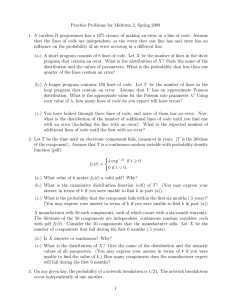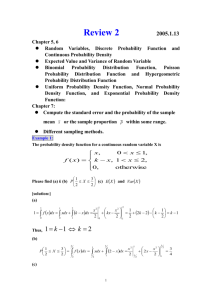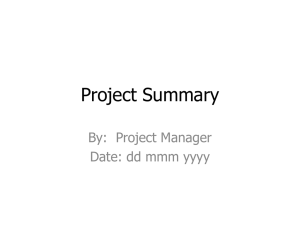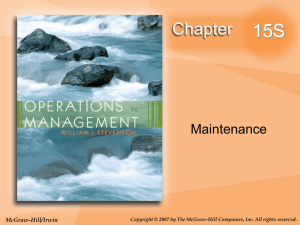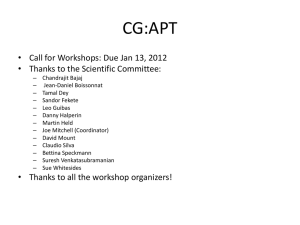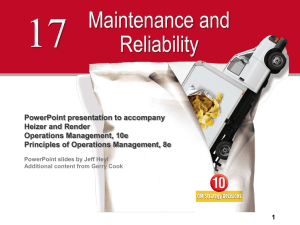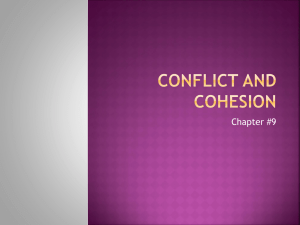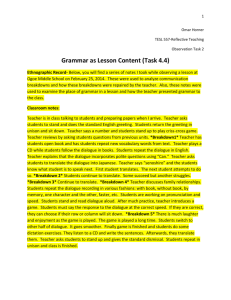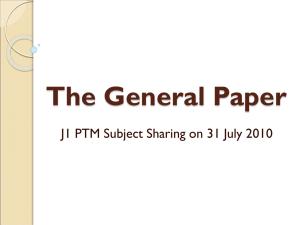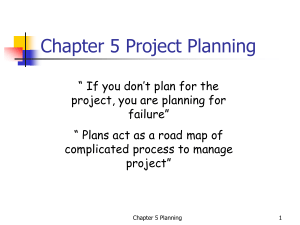Final case study 1 paper - 08FACEP802C-001-Inq-SpeEd
advertisement
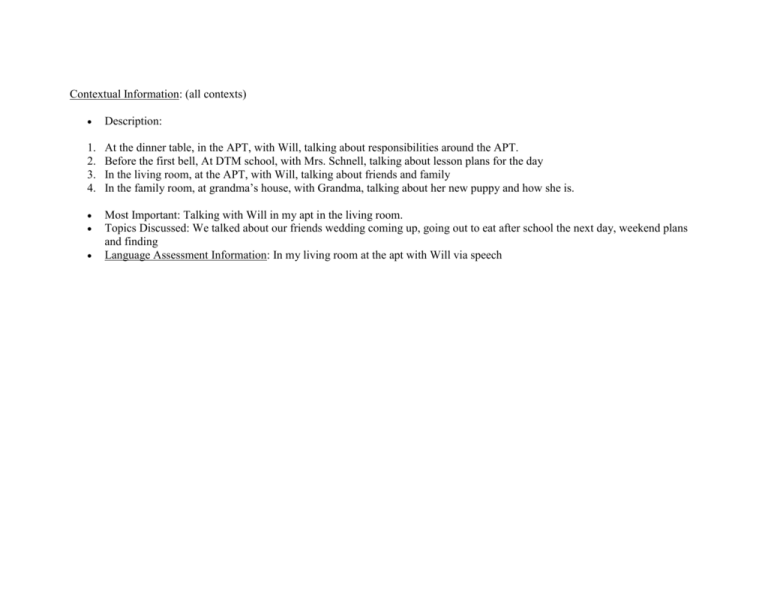
Contextual Information: (all contexts) Description: 1. 2. 3. 4. At the dinner table, in the APT, with Will, talking about responsibilities around the APT. Before the first bell, At DTM school, with Mrs. Schnell, talking about lesson plans for the day In the living room, at the APT, with Will, talking about friends and family In the family room, at grandma’s house, with Grandma, talking about her new puppy and how she is. Most Important: Talking with Will in my apt in the living room. Topics Discussed: We talked about our friends wedding coming up, going out to eat after school the next day, weekend plans and finding Language Assessment Information: In my living room at the apt with Will via speech Conversational Topics 6 5 4 Relationship 3 Work 2 Friends and Family 1 0 A Key: A= 9/20 B=9/21 C=9/22 D=9/23 E=9/29 B C D F=9/30 G=10/1 Most important context: In apartment Living room with Will via speech. Communication Breakdown: When I had a communication breakdown with Will I tend to get more frustrated and scrunch my eyebrows at him indicating I have no idea what he is talking about. I also seem give him a “are you talking English look” and I lean forward more. When Will is having a communication breakdown and doesn’t understand he looks at me blankly and often tries to act like he knows what is going on by saying “uh huh” a lot more often and gets a little more fidgety. I think he does this because he knows that when he has a breakdown, I get upset that he’s not following. Will also tries to give me the information back when he has a breakdown and I know he didn’t understand because the information is all messed up and backwards. CB Topics: 6 5 4 3 Relationship Bills 2 Family/Friends 1 10/15/2008 10/14/2008 10/13/2008 10/12/2008 10/11/2008 10/10/2008 10/9/2008 10/8/2008 10/7/2008 10/6/2008 10/5/2008 10/4/2008 10/3/2008 10/2/2008 10/1/2008 9/30/2008 9/29/2008 0 CB Causes: We tend to have the most CB breakdowns when talking about Friends and Family. I think the breakdown happens the most during the exchange of information part of the conversation because we either don’t know background to understand the story, we don’t know who the other is talking about, we don’t care so we don’t listen and then don’t understand if a question is asked. 7 6 9/29/2008 9/30/2008 5 10/1/2008 4 10/5/2008 10/6/2008 3 10/8/2008 10/9/2008 2 10/14/2008 1 10/15/2008 0 Instrumental Regulatory Personal CB Impact: Usually after Will has not understood what I am trying to talk to him about when I am updating him on drama going on between some of my friends or family I usually roll my eyes, get frustrated say “do you ever listen” and start to walk away. When Will has a breakdown I have noticed after he still can’t piece it together he sighs a big sigh and says “forget it man” while turning to do another task. Language Intervention Information: (most important context & most frequent/serious CB topic only): In my apt talking with Will after dinner in the living room via speech, talking about friends and family. Language Goal: When I begin talking about my friends and my family I would like Will to be able to understand the whole series of events without me having to recap all of the things that went on prior. To do this I will give a small recap at the beginning like "You know how yesterday i was telling you about Jacee and her birthday..." This should give Will enough background instead of me assuming and hopefully there will be less breakdowns. Language Intervention (LI) Strategy: I will sit Will down face to face making eye contact as I ask him why he never remembers or understands what I am talking about when it comes to family and friends. I will ask him if it’s because it’s things that he isn't really interested in or if it’s just because it’s confusing. I will then try to explain why it’s important for me to have him understand these things and why I want to confide in him with these things. I will then tell him that I plan to go over a little bit what I want from him and what I can do to make the communication better but at the same time I want him to try and let me know when he doesn't understand instead of just acting like he understands. After we agree on something I will give him a kiss (my reinforcer) and change the subject! :) Impact of LI Strategy: 12 10 8 Express personal need Humor 6 Solve Prob Request clarification 4 convo turns 2 0 L-1 (10-4) L-2 (10-5) L-3 (10-6) L-4 (10-7) Most important: LI-1: Will and I begin talking about a friend’s birthday party and what her side of the story was. I begin out of nowhere talking about my friend and instantly see the breakdown about to occur so I quickly retract and give a small background to the info. Will jokes around with me several times about the happenings and it is clear that the short summary helped. ( we had 6 back and forth) LI- 2: Will starts talking to me about something his friends and him were talking about and I was clueless so I reminded him that I needed him to do the same for me and give me a small synopsis about what exactly it was that he was talking about. He seems to get a little frustrated looking up slightly and letting out a big sigh but I remind him that we are working on this together and he begins his summary.(12 back and forth) LI-3 Will and I are talking about his family and he brings up something that happened a very long time ago. I request that he tell me about what the heck he was talking about and he laughs teasing me that i am now the one that doesn't understand what he talks about anymore. He clues me in and I stay a little confused but understand enough to get through the convo.(12 back and forth) LI-4 I am talking to Will about work that I had done for my grams and then jump from that to how my sister annoyed me that same day. This confuses him and he looks at me with scrunched eyebrows. I then retrace my steps and talk to him about how these two linked and why it was that I was so annoyed. He asked many questions wanting to gain more information and clarify his understanding. He also jokes with me more about my story telling and we move on.(16 back and forth) Resources & Reflections: Resources: Schirmer, B. R. (2000). Language and literacy development in children who are deaf, 2nd Ed. Boston: Allyn and Bacon. Schery, Teris. Ph.D & Zika, Gail. M.E.D. Avoiding/Repairing Communication Breakdowns: Supporting Children with Cochlear Implants in Educational Settings. Council for Exceptional Children Division for Communication Disabilities and Deafness, Seattle, WA, April 2003. Retrieved on September 17, 2008 from http://www.dcdd.us/information/CEC03gail.doc DeThorne et. al, (2008). Genetic Effects on Children's Conversational Language Use. Journal of Speech, Language, and Hearing Research. 51, 423-435. o o o o o Reflections: Language Competence: Being competent in the speech/language. I have learned that even though I speak English all of my life, I am not competent in relaying information most of the time. I often assume way to high or I have also learned that my competence lacks when I am doing more thing than one at a time. I have learned after watching these changes in Will and I’s conversations that we both needed to work on the language we used with each other and think about each other’s language competence levels. Language Problems: Some of the problems that I look back and saw had a lot to do with me. I thought that it was funny to see where I was getting frustrated with Will not being able to follow my conversation but it was me after all that was being unclear in my story telling, unclear in my ability to communicate directions and also unclear in just how much responsibility Will was to have round the apartment. I was especially unclear about my friends and family and saw the largest amount of breakdowns because of this. Now that it has been brought to my attention, I now know what to work on and fix for later conversations not only with Will but with anybody. Language Assessment: In looking back and assessing the language use between Will and I, I noticed that it wasn’t a lot of deep, rich conversation. In order to fix this, Will and I needed to address the communication breakdown issues and make them work better with less breakdowns all together. After this we had more time and energy to discuss things that took more “brain power” and were able to articulate our ideas to one another with no problem. Language Intervention: After using my intervention strategies, I noticed a big change in the amount of information Will and I were able to exchange in fewer exchanges. I think it was really cool to stop and think about why we were having these breakdowns and how we could avoid them. This also caused for a much reduced amount of frustration between the two of us and now it seems we have better richer conversation because we are able to get into more depth with each other instead of having multiple breakdowns in a single conversation.
